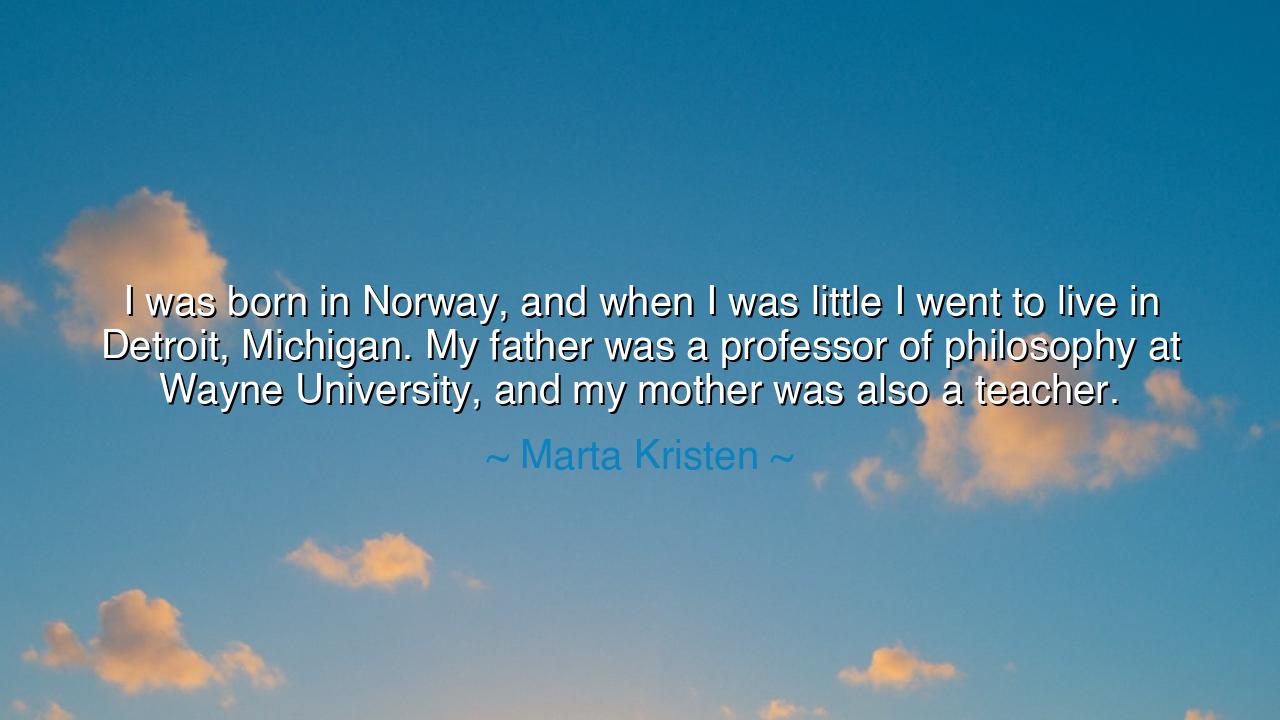
I was born in Norway, and when I was little I went to live in
I was born in Norway, and when I was little I went to live in Detroit, Michigan. My father was a professor of philosophy at Wayne University, and my mother was also a teacher.






In the gentle remembrance of Marta Kristen, we hear not just the story of a childhood, but the weaving together of identity, heritage, and wisdom: “I was born in Norway, and when I was little I went to live in Detroit, Michigan. My father was a professor of philosophy at Wayne University, and my mother was also a teacher.” Though these words appear simple, they contain within them the seeds of destiny, for they reveal how place, family, and knowledge shape the soul. They remind us that every life is a bridge between cultures, and that within the home of a teacher and philosopher, a child grows under the shadow of wisdom.
To be born in Norway, land of fjords, forests, and ancient sagas, is to be tied to a heritage of strength and endurance. From such a birthplace flows the memory of a people who braved storms and carved a life amidst rugged beauty. Yet, to journey as a child to Detroit, the beating heart of American industry, is to step from one world into another—from ancient landscapes into the noise of machines, from tradition into modernity. Marta’s life, therefore, begins as a story of crossing, of belonging to more than one land, and of carrying two worlds within her spirit.
The mention of her father, a professor of philosophy, is no small detail. Philosophy is the love of wisdom, the search for truth beyond appearances. To grow up under such guidance is to be taught that life is more than survival, that every question holds weight, and that the mind must be sharpened like a sword. Her mother, too, as a teacher, embodied the patience of guidance, the discipline of nurturing others, and the sacred duty of shaping the young. From both parents, Marta inherited a household not of wealth, but of learning—a house where thought was honored, and education revered as the highest calling.
History reminds us of how deeply such environments can shape destiny. Consider Marcus Aurelius, Roman emperor and philosopher, raised amidst teachers of rhetoric and philosophy, who grew to govern not only with power but with wisdom. Or recall John Stuart Mill, whose father educated him relentlessly in philosophy and economics from childhood, giving him the tools to become one of the great thinkers of liberty and ethics. Like Marta, these figures were shaped not only by their natural gifts but by the intellectual soil into which they were planted.
The meaning of Kristen’s words is this: our origins matter, not only the soil in which we are born but also the voices that guide us as we grow. To be raised by a philosopher and a teacher is to be trained to look both outward and inward, to see the world as a place of questions and possibilities, and to carry forward the responsibility of learning. Though she would one day walk the stage and screen, her foundations were already laid in the classrooms of her parents’ lives.
The lesson we take from this is clear: honor your beginnings. If you are blessed with teachers in your family, draw deeply from their well. If not, seek teachers beyond your home, for wisdom is the inheritance that shapes destiny. Remember, too, that to teach is the noblest of tasks—for teachers are not merely workers of the present, but architects of the future. A mother or father who teaches does not shape one life alone, but through that child, countless others who will be touched by them.
In practice, this means carrying gratitude for the lands that shaped you, and the voices that guided you. It means remembering that every experience—whether the stillness of Norway’s mountains or the noise of Detroit’s factories—has a lesson to teach. And it means valuing those who offer knowledge, for they are the unseen pillars of every success.
Thus Marta Kristen’s quiet remembrance becomes for us a living teaching: “I was born in Norway… my father was a philosopher, my mother a teacher.” Let us hear in it the reminder that where we come from matters, but even more, who we learn from matters most. For the soul that is guided by wisdom and nourished by teaching becomes not only an individual, but a vessel carrying forward the light of many generations.






AAdministratorAdministrator
Welcome, honored guests. Please leave a comment, we will respond soon